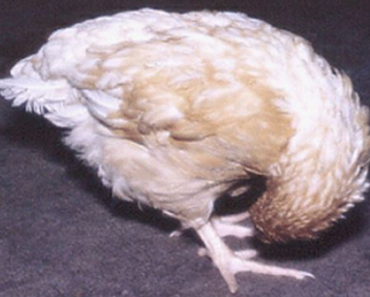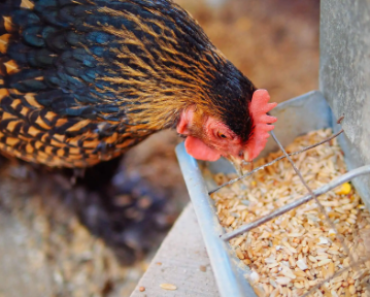Contents
- 1 Natural Ways to Treat Coccidiosis in Chickens: A Comprehensive Guide
- 2 Natural Remedies for Treating Coccidiosis in Chickens
- 3 Herbal Supplements: Nature’s Solution for Coccidiosis
- 4 Probiotics: The Friendly Bacteria Defense Against Coccidiosis
- 5 FAQ
- 5.1 What are some natural remedies or treatments for coccidiosis in chickens?
- 5.2 Are there any specific herbs or supplements that can help prevent or treat coccidiosis naturally in chickens?
- 5.3 Can implementing certain management practices, such as rotating pastures or providing a clean environment, help control coccidiosis in chickens without using conventional medications?
- 5.4 Related Posts

Discover effective ways to alleviate symptoms and promote the health of your flock without relying on harsh chemicals. Join me as we dive into the world of natural chicken care.
Natural Ways to Treat Coccidiosis in Chickens: A Comprehensive Guide
Coccidiosis is a common parasitic disease that affects chickens. If left untreated, it can lead to severe health problems and even death in your flock. However, there are several natural ways to treat coccidiosis and keep your chickens healthy.
1. Maintaining Clean Coops: Regularly clean and disinfect your chicken coops to prevent the buildup of coccidia oocysts, which are the infectious stage of the parasite.
2. Providing Clean Water: Make sure your chickens have access to clean, fresh water at all times. Dirty water can harbor coccidia and other pathogens, increasing the risk of infection.
3. Using Natural Antibacterials: Garlic, oregano, and apple cider vinegar have natural antibacterial properties that can help control coccidiosis. Add these ingredients to your chicken’s water or feed to boost their immune system and inhibit the growth of coccidia.
4. Feeding Probiotics: Probiotics promote the growth of beneficial bacteria in the chicken’s gut, which helps maintain a healthy digestive system and reduces the risk of coccidiosis. Consider adding probiotic supplements or fermented foods like yogurt to their diet.
5. Herbal Remedies: Certain herbs like chamomile and thyme have antimicrobial properties and can help treat coccidiosis. You can brew these herbs into a tea and add it to their drinking water or mix them into their feed.
6. Diatomaceous Earth: Food-grade diatomaceous earth is a natural product made from fossilized diatoms. It can help control coccidia by dehydrating the parasites, but make sure to use a food-grade version and follow the recommended dosage.
7. Rotating Pastures: If your chickens have access to pasture, rotating them to fresh areas regularly can help break the coccidia lifecycle, as the parasites need time to develop in the soil.
8. Strong Immune System: Keeping your chickens stress-free, providing a balanced diet, and ensuring they have adequate space and ventilation will help boost their overall immune system, making them more resistant to coccidiosis.
Remember, natural treatments for coccidiosis may take longer to show results compared to conventional medications. If the symptoms persist or worsen, consult a veterinarian for further guidance and consider using pharmaceutical treatments if necessary. With proper care and attention, you can effectively treat coccidiosis in your chickens using natural methods.
Natural Remedies for Treating Coccidiosis in Chickens
Understanding Coccidiosis: Learn about the causes and symptoms of coccidiosis in chickens, a common parasitic disease affecting their intestinal tract.
Natural Treatment Options: Explore various natural remedies such as herbal supplements, essential oils, and probiotics that help combat coccidiosis in chickens.
Prevention and Management: Understand preventive measures and proper management practices to reduce the risk of coccidiosis in your flock.
Herbal Supplements: Nature’s Solution for Coccidiosis
What are Herbal Supplements? Get acquainted with herbal supplements that harness the power of natural ingredients to support chicken health and combat coccidiosis.
Effective Herbal Remedies: Explore specific herbs like oregano, garlic, and thyme, which have proven anti-parasitic properties and can be used to treat coccidiosis naturally.
Administration and Dosage: Understand the correct dosage and methods of administering herbal supplements to maximize their effectiveness in combating coccidiosis in chickens.
Benefits and Considerations: Learn about the potential benefits of using herbal supplements, as well as any potential limitations or contraindications to be aware of.
Probiotics: The Friendly Bacteria Defense Against Coccidiosis
Understanding Probiotics: Gain insight into how probiotics work to support the gut health of chickens and enhance their natural immunity against coccidiosis.
Probiotic Strains for Coccidiosis: Discover specific probiotic strains such as Lactobacillus and Bifidobacterium that have shown promising results in preventing and treating coccidiosis in chickens.
Administration and Benefits: Learn about different ways to administer probiotics, including through feed or water, and the potential benefits of incorporating probiotic supplementation into your chicken management practices.
Combining Natural Remedies: Consider the advantages of combining herbal supplements and probiotics in a holistic approach to effectively treat and prevent coccidiosis in chickens naturally.
FAQ
What are some natural remedies or treatments for coccidiosis in chickens?
Coccidiosis is a common and highly contagious parasitic disease that affects chickens. While there are several commercial medications available to treat coccidiosis, some chicken owners prefer to use natural remedies. Here are a few options:
1. Apple cider vinegar (ACV): Adding a small amount of raw, unfiltered ACV to the chickens’ drinking water can help create an acidic environment in their intestines, which inhibits the growth of coccidia. Mix 1-2 tablespoons of ACV per gallon of water.
2. Garlic: Garlic is known for its antimicrobial properties. Adding crushed garlic cloves to the chickens’ feed or water may help boost their immune system and reduce the severity of coccidiosis. However, excessive garlic intake can be harmful, so use it in moderation.
3. Oregano oil: Oregano oil has natural antimicrobial properties and can potentially help control coccidiosis. Add a few drops of oregano oil to the chickens’ drinking water or mix it with their feed.
4. Diatomaceous earth (DE): Food-grade diatomaceous earth can be used to control external parasites and some internal parasites like worms. However, its effectiveness against coccidiosis is not well-studied. Mix a small amount of DE with the chickens’ feed.
It is important to note that while these natural remedies may help prevent or reduce the severity of coccidiosis, they are not guaranteed to eliminate the infection. If your chickens show severe symptoms or the condition worsens, consult a veterinarian for appropriate treatment.
Are there any specific herbs or supplements that can help prevent or treat coccidiosis naturally in chickens?
There are several herbs and supplements that can help prevent or treat coccidiosis naturally in chickens. These include:
1. Garlic: Garlic is known for its antibacterial and antiparasitic properties. Adding crushed garlic to the chickens’ feed or mixing it with their drinking water can help prevent coccidiosis.
2. Oregano: Oregano contains compounds such as carvacrol and thymol, which have antimicrobial and anticoccidial effects. Adding oregano essential oil or dried oregano to the chickens’ diet can be beneficial.
3. Apple cider vinegar: Adding a small amount of raw, unfiltered apple cider vinegar to the chickens’ drinking water can help maintain a healthy gut flora and prevent coccidiosis.
4. Probiotics: Probiotics can help populate the chickens’ gut with beneficial bacteria, improving their overall digestive health and reducing the risk of coccidiosis. Look for poultry-specific probiotic supplements or use fermented foods like yogurt as a natural source of probiotics.
5. Herbal blends: There are commercially available herbal blends specifically formulated for chickens to support their digestive health and immunity. These blends often contain a combination of herbs such as thyme, cinnamon, and ginger.
While these natural remedies can be helpful in preventing and treating coccidiosis, it’s important to remember that they should not replace proper hygiene practices, clean housing, and regular veterinary care. If you suspect coccidiosis in your flock, consult a veterinarian for an accurate diagnosis and appropriate treatment plan.
Can implementing certain management practices, such as rotating pastures or providing a clean environment, help control coccidiosis in chickens without using conventional medications?
Yes, implementing certain management practices (such as rotating pastures or providing a clean environment) can help control coccidiosis in chickens without relying on conventional medications. Coccidiosis is a common and costly disease caused by the parasite Eimeria, which affects the intestinal tract of poultry. By employing strategies that reduce exposure to the parasite or enhance the bird’s natural defenses, producers can effectively manage coccidiosis.
Rotating pastures is an effective practice that helps break the parasite’s lifecycle. By moving chickens to fresh, uncontaminated pastures regularly, the birds are less likely to ingest high levels of infective oocysts present in the soil. This reduces the buildup of Eimeria populations over time and decreases the risk of severe coccidiosis outbreaks.
Maintaining a clean environment is crucial to minimizing parasite development and spread. Regularly cleaning and disinfecting poultry houses, removing manure, and practicing good biosecurity measures greatly decrease the chances of coccidiosis transmission. This also includes providing clean, uncontaminated feed and water sources to prevent the uptake of infected material.
In addition to these practices, proper nutrition and immune support can play a key role in controlling coccidiosis. Providing a balanced diet with adequate levels of vitamins and minerals strengthens the chicken’s immune system, making it more resistant to infections. Probiotics and prebiotics can also be incorporated into the feed to enhance gut health and support beneficial microflora, further reducing the risk of coccidiosis.
While these management practices can be effective in controlling coccidiosis, it is essential to monitor bird health regularly. If outbreaks occur or if birds show signs of severe infection, consultation with a veterinarian may be necessary to determine if additional interventions, such as targeted medication, are needed.
Treating coccidiosis in chickens naturally is not only possible but also beneficial. By implementing natural remedies such as herbal supplements, sanitation practices, and proper nutrition, chicken owners can effectively combat this common poultry disease without relying on harsh chemicals or antibiotics. Remember to consult with a veterinarian for accurate diagnosis and guidance, but also consider incorporating these natural methods to promote the overall health and well-being of your flock. With a proactive approach and mindful care, you can keep your chickens healthy and thriving for years to come.






